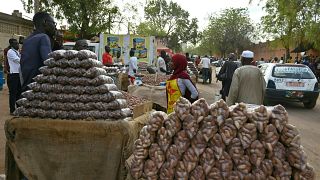Nigeria
Nigeria’s inflation rate rose in February after recording a fall in January as Africa's most populous nation faces fuel shortages that have helped push prices higher.
The country's statistics office announced Tuesday that the consumer price index (CPI) increase between February 2021 and February 2022 was 15.70 per cent, higher than 15.60 per cent recorded in January,
The National Bureau of Statistics (NBS) said the prices of goods and services, measured by the Consumer Price Index, fell 1.63 per cent points lower than the rate recorded in February 2021 (17.33 per cent).
The rise in the food index was caused by increases in prices of bread and cereals, food products, potatoes, yam and other tubers, oils and fats and fruit, according to the NBS.
“The percentage change in the average composite CPI for the 12 months period ending February 2022 over the average of the CPI for the previous twelve months period was 16.73 per cent, showing 0.14 per cent point from 16.87 per cent recorded in January 2022,” the stats office disclosed in its report.
Nigeria has faced fuel shortages since February after importing substandard fuel which resulted in weeks of severe scarcity and long queues at filling stations. The shortage has seen transport cost rise, thereby affecting goods and commodities.
Without functional refineries, Africa’s largest oil producer relies almost entirely on imported fuel.











Go to video
Libya devalues currency for first time in four years amid fiscal strain
03:06
Nigeriens frustrated by ongoing fuel shortage
03:29
Women rally for equality in Lagos on International Women's Day
02:43
Nigeria: Ash Wednesday marks Lent's start with prayers for Pope Francis
Go to video
Muslims in Cairo stock up on provisions for Ramadan
01:49
January sees Egypt's inflation Fall to 23.0% due to base effect